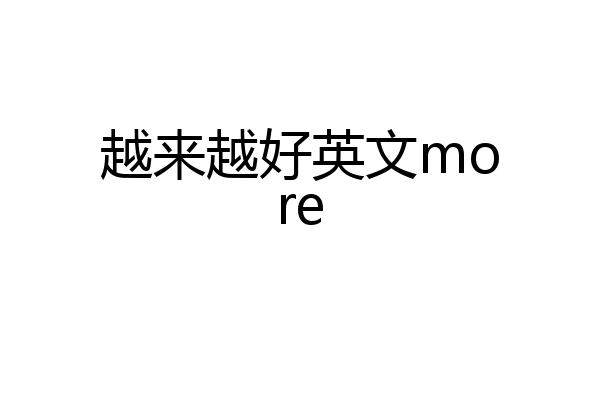
lukylukycat
more就是形容词一、单独作为manymuch的比较级,为形容词,表“更多……”。 1.A big truck is carrying more oranges than that one.(many的比较级) 这辆大卡车比那辆装的桔子多。 2.Is there more water in the yellow glass than that in the green one?(much的比较级) 那黄杯里的水比绿杯里的多吗? 二、常放在数词或some,any等后面,表“更多、额外数量”,相当于形容词,其后往往省略名词。 1.There’re only two books.we’ll need one more. 那儿只有两本书,我们还需要一本。 2.—Would you like some more? 你还要吃一些吗? —No,thanks.i’m full. 不,谢谢,我饱了。三、more and more用在名词前,表“越来越多”,用来修饰形容词、副词(双音节或多音节)时,表“越来越……”。 1.There are more and more books in the library. 图书馆里的书越来越多了。 2.English is becoming more and more important.we must work hard at it. 英语变得越来越重要了,我们必须努力学好它。 其他用法:一、副词,与某些双音节或多音节的形容词、副词一起构成其比较级。 1.I think our city is more beautiful than yours. 我认为我们的城市比你们的更美丽。 2.Han mei studies more carefully than wang fang. 韩梅比王芳学习更认真。 二、the more,the better表“越来越好”,the more可放名词前。 1.The more books we have,the better we are.我们的书籍越多越好。 2.The more friends she has,the better she is.她的朋友越多越好。 “the


海上的海
越来越好的英语是:become better and better
become better and better:
变得越来越好
短语
become better and stronger 变得更好
Become better thinkers and learners 更善于思考
poverty and become better off 脱贫致富
例句:
“The models become better and better the more text you process, ” Mr. Och said.
奥奇说:“处理的文本越多,所建的语言模型就越好。”
扩展资料:
better
英 [ˈbetə(r)] 美 [ˈbetər]
adj. 更好的;更熟练的;更合适的;(病势)好转的
adv. 更好地;更多地;较大程度地;更恰当
n. 较好者;能力更强者;上司们;打赌者
v. 胜过,超过;(社会地位)改善
n. (Better) (美、法、俄)贝特尔(人名)
短语:
better than 超过;多于;好于…
better than oneself ◎所做的比所答应的好 , ◎超过应尽的责任
had better 最好
do better 做得更好
get better 变得更好;康复
better and better adv. 越来越好
for the better 好转,向好的方向发展
feel better 感觉好点了
例句:
If he will help us, so much the better.
假如他肯帮助我们那就更好了。

吃遍全宇宙!
我重新整理的more的用法 more 一词在课本中出现较频繁.为了让同学们进一步了解它,现将其常见用法归纳如下: 一、副词,与某些双音节或多音节的形容词、副词一起构成其比较级. 1.I think our city is more beautiful than yours. 我认为我们的城市比你们的更美丽. 2.Han Mei studies more carefully than Wang Fang. 韩梅比王芳学习更认真. 二、单独作为manymuch的比较级,为形容词,表“更多……”. 1.A big truck is carrying more oranges than that one.(many的比较级) 这辆大卡车比那辆装的桔子多. 2.Is there more water in the yellow glass than that in the green one?(much的比较级) 那黄杯里的水比绿杯里的多吗? 三、常放在数词或some,any等后面,表“更多、额外数量”,相当于形容词,其后往往省略名词. 1.There’re only two books.We’ll need one more. 那儿只有两本书,我们还需要一本. 2.—Would you like some more? 你还要吃一些吗? —No,thanks.I’m full. 不,我饱了. 四、not…any moreno more表“不再”. 1.The baby can’t eat any more.这个婴儿再也吃不下去了. 2.Jim and his family went to England.We saw them no more. 吉姆和家人去英国了,我们再也没有看到他们. 五、more and more用在名词前,表“越来越多”,用来修饰形容词、副词(双音节或多音节)时,表“越来越……”. 1.There are more and more books in the library. 图书馆里的书越来越多了. 2.English is becoming more and more important.We must work hard at it. 英语变得越来越重要了,我们必须努力学好它. 六、the more,the better表“越来越好”,the more可放名词前. 1.The more books we have,the better we are.我们的书籍越多越好. 2.The more friends she has,the better she is.她的朋友越多越好. “the more,the+比较级”中第二个the后可接其它比较级形式,如the more…,the worse…越多越糟. 七、放在than前,构成more than短语,相当于over.它们常放在数词前,表示“多于……,超过……以上”. Kate is a good student.She has more than one hundred books. 凯特是一个好学生,她有一百多本书. 八、more or less为固定短语,相当于about,表“或多或少;差不多”. 1.They are more or less willing to help.他们多少愿意帮助. 2.—How far is the post office from here? 邮局离这儿多远? —It’s eight kilometers,more or less.大约八公里.
优质英语培训问答知识库